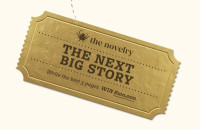Minding the ‘Brand,’ for Better or for Worse
observer.com – Tuesday January 9, 2024

Branding has forever changed the publishing industry and, in the process, what it takes for ambitious authors to break in.
Over the last year, three books of mine have been published. The first, from a large indie press, was a philosophical takedown of woke subjectivism. The second, from a U.K. press specializing in rock star memoirs, was a middle-grade novel about a traumatized kid who begins to hallucinate the ghost of John Lennon. The third, from a conservative-libertarian startup press, was a comic novel set at the dawn of the social media age, about a 30-something mom whose ne’er-do-well husband convinces her to post risqué photos on the internet.
You’d think three books in one year would be a cause for celebration. Yet I’m driving my loyal-to-a-fault literary agent crazy… because I don’t have a brand.
Brands are shorthand devices to convey clusters of information. Most large corporations have a brand. Pepsi has one. So does Burger King. So do Nike, Cadillac and Citibank. Each brand has an instantly recognizable logo, intended to differentiate the business from its competitors and remind you that you’re dealing with an established, credible entity. But a brand also limits the brand-holder’s relevance. If Pepsi, for example, announced it developed a kiwi-infused cola, I’d be intrigued. Pepsi does a fine job with colas, so its processes should work with kiwi flavor. On the other hand, if I’m shopping for auto parts and see Pepsi snow tires, I’m going to pass since that’s not what Pepsi is known for. The company may produce a hell of a tire, but why go that route when you can go with Goodyear—a brand specifically known for tires? It would be like buying Goodyear ginger ale. Or Cadillac cotton swabs.
So it makes sense for businesses to develop a brand. Yet there’s something counterintuitive and vaguely philistine about the notion that writers should develop one. What is a writer’s brand? Essentially, it’s a cross between a credential and an identity. It’s the way the writer is viewed by potential readers and the public face by which he’s already known or will be known; it provides a roadmap for publishers to market his book. Here is the reality of publishing in 2023: Absent a discernible brand, a writer’s chances of finding a commercial publisher are severely diminished. Brands are a particular concern of the marketing departments at publishing houses, as you’d expect. But they’re also on the mind of editors at every stage of the publishing process, figuring prominently not only in getting the book into readers’ hands but also in the decision to acquire a manuscript in the first place.
To read the full article on observer.com, click here




 I dread writing any kind of romantic scene – or, even worse, anything remotely sexy
I dread writing any kind of romantic scene – or, even worse, anything remotely sexy The perils of writing about sex: 'Your partner will think it's about them. Or – even worse – someone else'
The perils of writing about sex: 'Your partner will think it's about them. Or – even worse – someone else' Why using exciting words can make you a worse writer
Why using exciting words can make you a worse writer Getting to know you: 8 questions to ask an interested agent
Getting to know you: 8 questions to ask an interested agent How I got a literary agent - An interview with author, Eric Houghton
How I got a literary agent - An interview with author, Eric Houghton Writing contest etiquette
Writing contest etiquette How I got a literary agent - An interview with author Geri Spieler
How I got a literary agent - An interview with author Geri Spieler The basics of author branding
The basics of author branding Up for a challenge?
Up for a challenge? New Literary Agent Listing: Danielle Marshall
New Literary Agent Listing: Danielle Marshall New Literary Agent Listing: James Gill
New Literary Agent Listing: James Gill Straight white author's career finally takes off after he tells woke publishers he's gender queer Nigerian
Straight white author's career finally takes off after he tells woke publishers he's gender queer Nigerian New Publisher Listing: Crowdbound
New Publisher Listing: Crowdbound New Literary Agent Listing: Lauren Liebow
New Literary Agent Listing: Lauren Liebow The Novelry Offers $100,000 Prize to Break Publishing Barriers
The Novelry Offers $100,000 Prize to Break Publishing Barriers The Sunday Post short story writing competition is back for 2025
The Sunday Post short story writing competition is back for 2025 Bestsellers LLC Unveils Data-Driven Publishing Model to Transform Authors into Industry Dominators
Bestsellers LLC Unveils Data-Driven Publishing Model to Transform Authors into Industry Dominators 404 Ink publishing house to close
404 Ink publishing house to close Agents Help YA Authors Find Crossover Success
Agents Help YA Authors Find Crossover Success Submission Grinder Delists Analog
Submission Grinder Delists Analog New Magazine Listing: Blackbox Manifold
New Magazine Listing: Blackbox Manifold New Literary Agent Listing: Ciara McEllin
New Literary Agent Listing: Ciara McEllin New Publisher Listing: Red Planet Books
New Publisher Listing: Red Planet Books New Literary Agency Listing: Betancourt Literary
New Literary Agency Listing: Betancourt Literary
